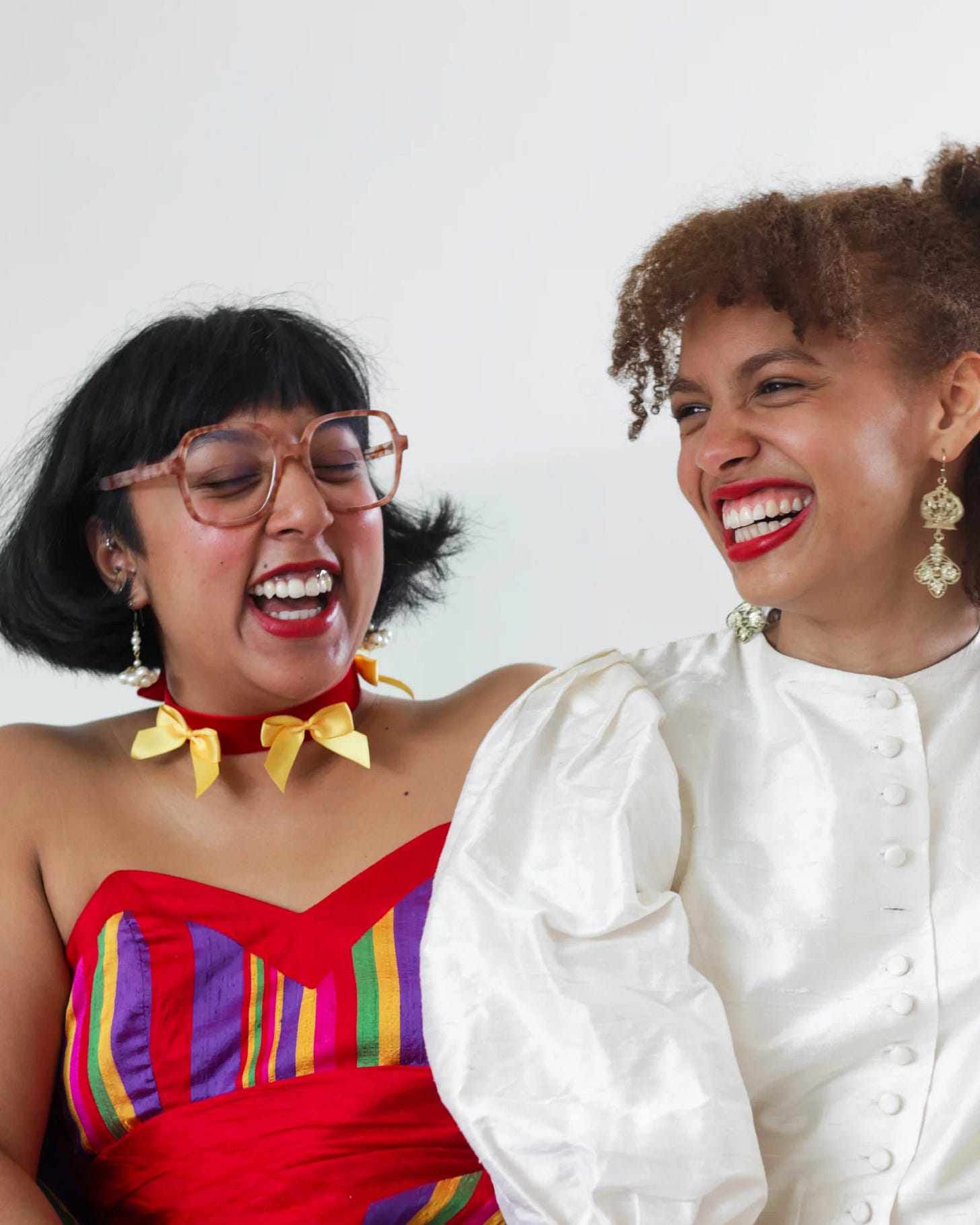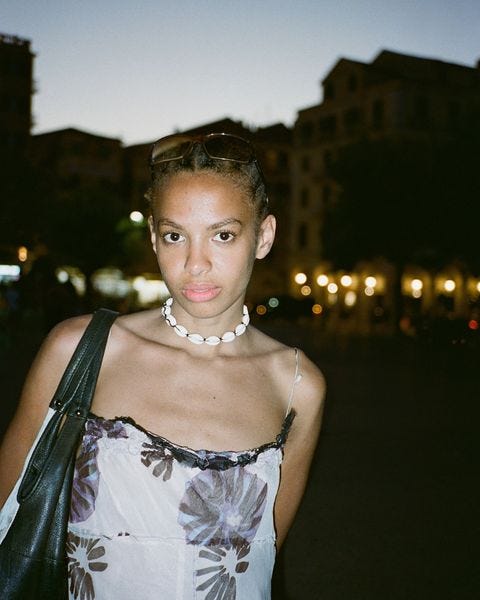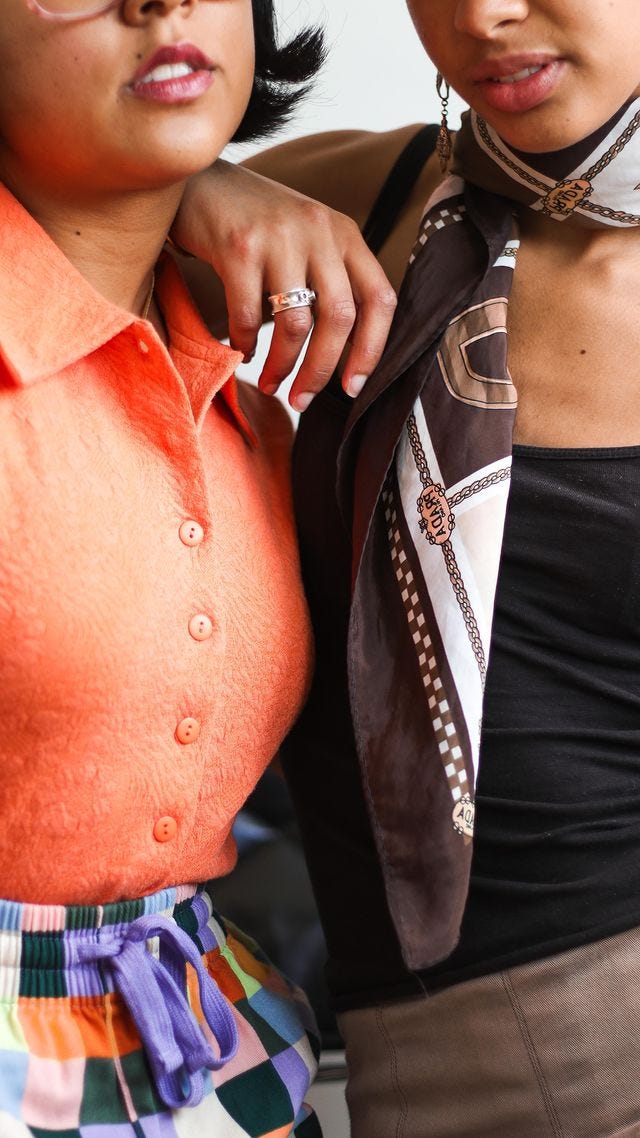Izzy Manuel and Rosie Okotcha: “Learning about your culture doesn't have to be with your family”
The podcasters on embracing the flaws in their cultures, adoption assumptions and feeling on the periphery
Hi, welcome back to Mixed Messages! Before we kick off this week, please consider a paid subscription – upgrading gives you exclusive monthly round-ups of all the mixed releases and happenings going on each month, extra content, extracts and giveaways on a Thursday, exclusive discounts for mixed-founded brands and access to our Mixed Media pages, with all the films, books, articles, podcasts and more you need to know about. I need your support to help keep Mixed Messages running. Subscriptions are just £3.50 a month or £35 a year.
Back to business! This week, we’re speaking to podcasters Izzy Manuel and Rosie Okotcha. Izzy is of mixed-Indian and Chinese heritage, Rosie is of mixed-Nigerian and white British heritage. Hosts of the Spill The Sustainabili-Tea podcast, Izzy and Rosie dive into some of the hottest and most controversial topics in the world of sustainability, from soft activism to quiet luxury. Get to know the people behind the mics below.
What are your backgrounds?
Rosie: I'm half-Nigerian and half-British. I grew up with my mum, who’s white, and her side of the family in the British countryside.
I’d say that I’m Black – although I don’t have the same experience as someone with a darker complexion, I move through the world more as a Black person. I don’t feel merged with the Nigerian or Black community in the UK, I often felt on the periphery of both.
When people meet me, they don’t think I’m mixed-race until I talk. I get a lot of ‘Oreo’ or ‘‘you’re actually white, why are you trying to be white?’ which is stupid, because any ethnicity can exist in any way.
Izzy: I’m half-Indian, half-Chinese. I grew up partly in London then moved to the countryside.
When I was in London, I was in an international school so I didn't feel different to anyone else, it was so multicultural. It genuinely felt very settled. Moving to the countryside, you feel very much like a minority. I’ve been called a coconut. Once, a girl said to me ‘you can't come to my house because you're Black.’ I was like, ‘there’s so much wrong with this statement.’
Physically I think I resemble more South Asian genetics, but if you look at my mum and I side by side you see the similarities. Weirdly, I’m closer to my Chinese heritage and family, whereas I don’t really interact with my Indian heritage due to family stuff. I have a few friends who are South Asian and I’ve hooked onto them, they see me as one of them. They’re teaching me so much about the culture.
What was it like living in the countryside, were you able to connect to all sides of your heritage?
R: I grew up in South Africa for six years before the UK because my parents wanted us to have the experience of an African country and Nigeria wasn’t really an option. That was pretty amazing, then we moved to the British countryside. I’d read Enid Blyton books so I remember driving through a forest and over a bridge with canal boats being like ‘this is not real.’ I’ve always felt connected to the countryside.
My dad moved over here because of the Biafran War when he was 13, so there’s a lot of trauma. I’ve learned a lot about my Nigerian side independently. Me and my sister are really interested in folk traditions and religions, indigenous cultures of Nigeria before colonialism got there. My grandma tells me a lot about how they sacrificed chickens and goats and it was such an important part of the community. I want to know the non-whitewashed version of Nigerian history. I’m on my own journey, learning to be connected to it in my own way.
I: I leaned in as far as you can go to my Chinese side. I was able to go back to Hong Kong every year as a child where I was surrounded by my grandparents. That culture is a cross between British and what we’d imagine the culture in China to be, but Chinese culture is so different to Hong Kong.
Every time I go home and visit my mum, we go for dim sum. I’m a very food oriented person – in the sustainability world, people think we’re all vegan. But as a mixed-race person, I connect with my culture through food and that means eating fish and meat. If my grandma cooks me a traditional Chinese meal, I’m not going to turn that down. I see her once a year for a week, if that. Especially because I don’t speak the language, food is a huge love language.
In terms of my Indian heritage, it’s complicated and that’s my dad’s story to tell. Due to family trauma, as soon as his mum passed away he forgot his language, and ignored his culture, so I never really grew up with it at all.
My full name is Isabel Fernandez Manuel. My family are from Kerala, where the Portuguese went and took Catholicism, so my family don’t have the beautiful Hindu traditions that I wish they had. It’s only in the last few years I’ve been learning more about South Asian culture. I’d love to go lehenga shopping, there are so many things I want to do, but it’s weird that it’s with my friends rather than my family.
R: It’s so important to realise that learning about your culture doesn't have to be anything to do with your family. It's your own personal journey. It’s really easy to feel like if you’re not connected to your family then you can’t be connected to the culture, but that’s two separate things. As mixed-race people, and considering the majority of people these days are divorced, it’s easy to feel like you’ve lost a bit of your culture. But it’s still there.
I: One of the things I tried to embrace is realising that there are flaws in this beautiful culture as well and that as a mixed-race person, I’m weirdly liberated from that experience. If I was 100% Indian, would I have to go through things like not being allowed to marry the person I loved or thinking about what caste they are. My parents liberated me from that pressure of having to be this perfect South Asian.
You both work in sustainability, a space that can be seen as quite white. But actually, our cultures have such deep connections to the land. Have your heritages influenced your work in this space?
R: Both of my parents are interested in the climate space, my dad sends me pictures of the Western clothes that get shipped to markets in Nigeria. My dad’s always been very connected to spirituality, teaching us that trees have their own spirit and energy that we have to respect.
I: I’d say no actually. In India, the people in the countryside are inherently connected to nature. But because I don't have that connection to my Indian heritage, I didn't grow up with any of that. Hong Kong is a whole new world of not giving a shit about the planet. My parents love to travel, and I actually spent a lot of time in Fiji growing up. I have very close friends that really live off the land. That’s where I understood the power of nature.
Have you noticed any stereotypes around mixed identity? How do you want the conversation to develop?
R: There’s a huge stereotype about being a Drake mixed-race, or if you have a white mum then it means you don’t know how to do your hair or understand what being Black is about.
I: It really annoys me when I see stuff saying ‘you aren't allowed to be part of this culture because you're not 100%.’
R: There’s a lot of anger from the Black community about white women stealing Black men. So if you’re a product of a white mum and a Black dad, people are like ‘fuck you.’ There seems to be this thing when a white man marries a Black girl it’s like ‘wow, he’s breaking all the norms, he’s one of us,’ so there’s a big difference.
There’s also a lot of fetishisation. People have only wanted to date me because I’m mixed-race, because I’m not fully Black, or said they want mixed kids who have light skin and blue eyes.
I: What I find really hard is that a lot of the hate comes from your own people.
R: That’s where it feels very difficult and why it's very much a peripheral existence, for me anyway. Not quite Black enough to be considered Black, definitely not visually white enough. No one understands that way of existing other than [mixed people.]
I: People used to assume I was my grandma’s maid in Hong Kong.
R: People would also assume I was adopted when my mum was white in a white area with her three mixed-race kids. I also look almost identical to my mum, so if you just took a second…
I: I was in a high-end shop with my dad who was buying me an 18th birthday gift. We sat down to do some paperwork and they asked what our relationship was, was I his wife. We just looked at each in pure disgust.
What’s the best thing about being mixed for you?
I: Learning about different cultures in a really deep, loving and rooted way. I get to experience Indian and Chinese culture and amalgamate them into one beautiful, random, chaotic person. You do feel isolated, not knowing where you belong, but as I’ve got older, I’m more into learning. Why should I be embarrassed about it?
R: Having access to two cultures is amazing. People don’t consider the UK as having a culture, but there’s some beautiful lost and forgotten traditions. I like to focus on those older ones rather than the EDL types. I love blackberry picking and apple crumble, as well as egusi soup and plantain. There’s nothing better than a Sunday roast with plantain on the side, it’s those moments of being able to appreciate both.
Can you sum up your mixed experiences in one word?
I: Colourful. It's a bit wild, a bit of everything, a bit positive, a bit negative. I’ve generally had quite a fun ride.
R: It’s hard because I don’t know anything other than this, so I can’t really compare it. But I find life beautiful, so I guess beautiful. This experience of being a human at this time in the world is beautiful.
Listen to Spill The Sustainabili-Tea wherever you get your podcasts. Next week, I’ll be speaking to founder of FairyLoot, Anissa de Gomery. Subscribe to get Mixed Messages in your inbox on Monday. Shop Mixed Messages on Etsy now!
Enjoy Mixed Messages? Support me on Ko-Fi! Your donations, which can start from £3, help me pay for the transcription software needed to keep this newsletter weekly, as well as special treats for subscribers. I also earn a small amount of commission (at no extra cost to you) on any purchases made through my Bookshop.org and Amazon affiliate links, where you can shop books, music and more by mixed creators.
Mixed Messages is a weekly exploration of the mixed-race experience, from me, Isabella Silvers. My mom is Punjabi (by way of East Africa) and my dad is white British, but finding my place between these two cultures hasn’t always been easy. That’s why I started Mixed Messages, where each week I’ll speak to a prominent mixed voice to delve into what it really feels like to be mixed.











Really inspiring with some interesting perspectives here - I never thought about connection to one side of our/a/my culture(s) as not coming from the family, but that's a really generative and hopeful thing to consider/take into account.